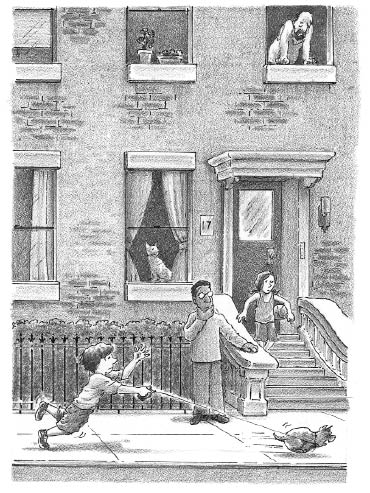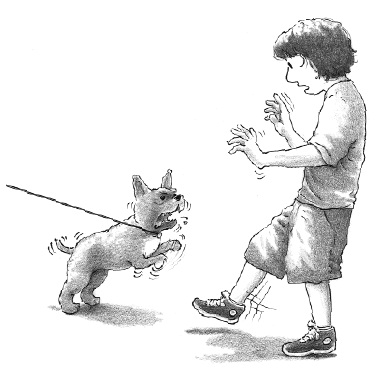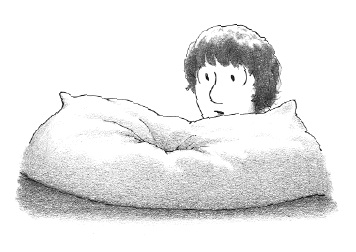Invisible Inkling (2 page)
Authors: Emily Jenkins

A
thing about me and Wainscotting was, we always called each other by last names. In fact, we called
everyone
by last names, ever since we went to Science Fellow camp the summer after second grade. It was last names all the time there.
Instead of Hank, I got to be Wolowitz.
Alexander got to be Wainscotting.
We thought we sounded like secret agents.
Only, yeah.
I forgot.
I don't want to talk about Wainscotting.
I notice Inkling again the next day. During her afternoon break, Nadia convinces me to quiz her on her vocab words up in the Big Round Pumpkin overlook. She wants to know them by the start of eleventh grade because of all these tests she has to take for college. Nadia takes words and spelling very seriously. She used to win bees.
The overlook is a loft at the back of the ice-cream shop. My parents keep stuff there that they hardly ever need: holiday trim and spare parts for the machines. You climb up to it on a ladder. There's not much room to stand, but there's an old coffee table, a scrap of carpet, and a bookcase. Best, there's a window that looks out on the store from above.
From the window, you can see that the shop floor and all the lamps are pumpkin orange, but the counters and tables are white. The walls have photographs of jack-o'-lanterns, blown up much larger than they are in life. The tubs of ice cream look like little spots of color in an orange and white world.
I like to guess what people will order, based on what they're wearing, how they walk, what accent they have. “What about that guy with the long hair?” I ask Nadia as she's climbing up the ladder.
She joins me at the window. “The one with the tan shorts?”
“Yeah. I think he's cinnamon mocha.”
“He does look like he hangs around in coffee shops,” Nadia agrees. “Those guys usually go for coffee flavors. But I think he's a vegan. He won't want any milk. So . . . raspberry sorbet.”
“Raspberry is girlie,” I say.
Nadia smacks me on the arm. “Flavors are not girl flavors or boy flavors.”
“It's pink. Men never order pink ice cream.”
“Really?”
I nod. I like to watch people. Notice things about them. It's interesting. “Lots of the regular customers always get the same thing,” I tell Nadia.
“
You
always get the same thing.”
That's true. I get cookie dough with chocolate sprinkles. But other people have favorites, too. “Wainscotting always got plain chocolate,” I say. “Chin from downstairs gets strawberry with hot fudge. Mom, lemon sorbet.”
“Dad?”
“Heath bar brownie with butterscotch sauce
and
hot fudge, whipped cream, and a cherry on top. That's his favorite. But he likes to mix it up.”

Nadia laughs. “All right, you little weirdo, quiz me on the vocab.” She moves away from the window and lies down on the floor of the overlook. That's her favorite place to do serious word study.
“Okay,” I sayâbut I don't quiz her just yet. I hold her list in my hand. I'm staring down into the shop, letting my mind go on the way it does, whenâ
I see a waffle cone scooting along the counter.
Not lying down and rolling, but scooting. Standing up, like it's ready for a scoop of ice cream.
Moving like it has a will of its own.
Like it just thought, Oh, I'm tired of being here in this stack with the other cones. I think I'll go for a walk down to the other end of the counter, see what's doing with the sprinkles.
Then one, two, threeâ
It disappears.
As if it was never there.
“Did you see that waffle cone?” I ask Nadia.
“I'm lying on the floor.”
“That waffle cone was
moving
. And now it's gone.”
“You and your brain,” she says. “Do you know the definition of the word
hallucination
?”
“No.”
“Look it up.”
I check her list and read aloud, stumbling over the big words. “âHallucination. An experience involving perception of something not present.'”
“And that means?”
“I think it means when you see something that's not there.”
“Exactly,” says Nadia.
“But I saw it!”
“You think you saw it,” says Nadia. “That's not the same as seeing it.”
“I know I saw it.”
“Okay, whatever. I don't want to argue,” says Nadia. “Will you quiz me on my words now?”
I
try to put the fur and the waffle cone out of my mind. None of the possible explanations are pleasant to think about. Weird stuff is happening that can't be explained by the laws of nature, in which case our planet might be in store for a global meltdown full of crazy lava explosions and plagues of frogs. Or my own personal Hank Wolowitz brain has not only the nerve disease where everything feels like fur,
but also
a strange eyeball problem where things appear to move that are actually not moving and things appear to be still that are actually moving. That means I'll never drive a car, much less a helicopter, because someone with my strange sight disease and my fur-feeling problem would never be a safe driver, and in fact, I probably shouldn't even be allowed to cross the street by myself.
To take my mind off it all, I help Nadia walk Rootbeer when her shift is over. She makes extra money as a dog walker, and her main client is the French bulldog who lives across the hall from us. Seth Mnookin, our neighbor, wants Rootbeer to have a half-hour walk every day.
I actually go with Nadia pretty often, because Rootbeer is funny. She snorts when she's excited and loves to run up and down the hallways in our building, snarfling at people's doors. Mnookin says she's looking for cats, but there aren't any to find. Still, she never gives up hope.
“Hank, my man,” says Nadia, when our walk is nearly finished, “will you take the leash? I have to text Max.” Max is Nadia's boyfriend. He's always texting her, but he never actually comes over to our place.
“Are you gonna pay me?” I ask. “For doing your job?”
I ask this every time she has me take the leash.
“No,” she says, pulling out her phone. “Because I'm still here. Supervising.”
That's what she always says.
Anyway, Nadia is texting and I have the dog. We are right near Big Round Pumpkin whenâ
Rootbeer takes off. Dragging me behind her, she runs full speed to a tree. Skids to a stop and starts crazy barking.
There aren't any cats. Or other dogs.
There aren't any letter carriers, pretty girls, old men, people with handbags, babies in strollers, or any of the other things Rootbeer usually barks at.
Rouw! Rouw!
Rootbeer howls and tries to climb the tree with her short legs.
“Does she see a squirrel?” asks Nadia, running to catch up.
We scan the trees. No squirrels.
Rootbeer takes off down the block, dragging me behind her with the leash. She skitters, knocking over garbage cans, snapping her jaws.
Nadia runs to the door of our building and holds it open. “Drag her in, Hank!” she yells. I try to pull Rootbeer inside, but the dog is racing round and round another small tree, tangling my legs in her leash. “I'm trying,” I callâbut then Rootbeer lunges for the door, knocking me over. I hit the sidewalk hard and feel the leash unraveling around my legs as the dog charges. I've lost my hold on her, and Rootbeer zooms into the building, barking and drooling.

Nadia and I chase up the stairs to the fourth floor to find the dog growling atâ
An empty corner of the hallway.
No cat. No squirrel.
Nothing.
“You're barking at air, loony dog,” says Nadia, half laughing, half angry. She grabs Rootbeer's leash, but the dog pulls against her.
“Treats!” coaxes Nadia, straining for the door of Mnookin's apartment. “Rootbeer, I have liver treats for you inside.”
The dog keeps growling at the corner.
I wave my hand through the empty space. “See, Rootbeer? It's empty”âbut my hand, expecting to swing through air, hits a trembling ball of fur.
I look.
There's nothing.
Nothing I can see.
But my hand is touching something, something warm.
Fur again.
Oh, oh, oh.
There is. Something. Invisible.
Here.
This is the thing I felt under the sink. Only now, trembling in the corner.
The thing that ate the waffle cone.
It has to be.
That thing is here. Terrified 'cause Rootbeer wants to kill it.
My head spins. The dog's drooling jaws are just a foot away.
Instinctively, I stroke the soft fur of the invisible thing.
It is lost, probably.
The creature's small forepaws reach up and grip my wrist, and I bend down, saying loudly, “Nothing here, see, Rootbeer? Don't bark at the air.”
The invisible thing climbs nimbly into my arms and wraps its front legs around my neck. I hold its warm, frightened body, trying to look like I am doing nothing much with my hands.
I kick the air of the corner where the creature has been sitting. “Nothing,” I say again. “Silly dog.”
Nadia pulls on Rootbeer's leash and reaches her key toward Seth Mnookin's apartment door, but suddenly the dog isn't lunging at the corner. She's coming at me. I back up as the invisible creature hugs me, heavy and shaking with terror.
“Save me,” it whispers in my ear.
I'm so shocked, I nearly fall down.
It can speak.
English.
The invisible creature claws my neck in fear, and I stumble back against the wall. “Put Rootbeer in Seth's apartment,” I tell Nadia. “Quick.”

Nadia bends down and grabs Rootbeer around the middle like you would a bag of potatoes. The dog wiggles and strains, running her short legs in the air and growling.
Nadia manages to get the door to Mnookin's apartment open. She tosses Rootbeer in.
I can hear the dog's nails skitter on the floor as she lands. She lunges to get back out, but Nadia slams the door and leans against it.
Rootbeer barks and doesn't stop.
Not Actually a
Big Round Pumpkin
W
hile Nadia fluffs up her drooping hair in our bathroom, I go to my room. I set the invisible creature gently on the pillow of my bottom bunk bed. There's a slight dent where it's sitting, but otherwise I can't tell it's even there.
“You okay?”
I feel strange speaking to the air, but the creature answers right away. “Alive!” it cries in a hoarse but energetic voice. “Alive, alive, alive!”
“Yeah,” I say, in wonder. “You are.”
“Alive!”
I can't believe this is happening. I have a rush of questions. “Are you hurt? Did Rootbeer bite you? Do you need a Band-Aid?”
And: “Why can't I see you? What kind of creature are you?”
And: “You're a boy, right? You sound like a boy.”
And: “Are there lots of your kind all over Brooklyn and we just don't know it? How do you make yourself invisible?”
The creature ignores everything. “Let me tell you this,” he says. “I owe you, big-time. You saved my life.”
“Can you appear and disappear? What do you look like? Are you bleeding? Are you even real?”
“Of course I'm real,” the creature snaps. “We're having a conversation, aren't we?”
“Yes, butâ”
“No buts. I'm here. I'm real. Get used to it. What's your name?”
“Wolowitz. I mean, my first name is Hank, but I'd rather you call me Wolowitz.
“Wolowitz! I'm Inkling.”
Wow.
I am having a conversation with an invisible animal. A normal conversation, just like I'd have with a human.
I wish Wainscotting was here for this.
“Is Inkling your first name or your last?” I ask.
“It's my
name
,” he says. “Lots of people have just one name.”
“Only pop stars.”
Inkling changes the subject. “What you did for me just now, Wolowitz? Fantastic. A heroic rescue. I am in your debt.”
“It wasn't much,” I say. “Anyone would have done it.”
“Are you kidding? It was life or death with thatâwhat did you call it?”
“Rootbeer,” I say.
“It was life or death with that rootbeer,” says Inkling. “I'm in your debt until I can return the favor. We bandapats have a code of honor.”

“Is that what you are?” I reach out. My hand connects with soft fur, though I still can't see anything. I run my palm gently along Inkling's back. “You're a bandapat?”
“A little-known mammal native only to the Peruvian Woods of Mystery,” Inkling explains. “We are extremely cute but naturally invisible, which helps our species survive in the fearsome woods among predators and other scary stuff.”
“And you speak English?”
“Of course,” he says. “And Yiddish. And Mandarin. All bandapats do. Only there aren't very many of us. We are endangered. I am the only one in Brooklyn. Possibly even in North America.”
“But why did you come
here
?” I ask. “I mean, with dogs and all that, I don't imagine it's very safe for you.”
“Bandapats eat squash,” Inkling explains. “We can eat almost anything, actually, but we
need
the squash because we need lots of vitamin A. What's more, it's really, really yummy.”
“Squash?”
“We prefer pumpkin, but we like butternut, too. Or acorn. Most any kind that's not zucchini,” says Inkling.
“Back to why you came here.”
“Oh. Where I come from, among the Ukrainian glaciersâ”
I interrupt: “I thought you said Peruvian Woods of Mystery.”
Inkling ignores me. “âthere developed a shortage. All the squash growing among the glaciers was harvested by humans to cook into pies and serve with turkey.” He sighs.
“The last of my kind began to waste away for want of it. There were so few of us, so fewâand finally, there was only me.”
Even though he's for-serious lyingâhello? there are no squash growing in glacier iceâI like his stories. He probably has an overbusy imagination, too. Plus, I feel a wave of sadness for Inkling.
He's all alone, in a world that can't even see him.
There's nobody like him for miles, even continents, around.
“Why come to Brooklyn for squash?” I ask. “I mean, we have squash, you can get it in the stores, but it's not, like, the squash capital of the planet or anything.”
“Ahh,” says Inkling, sounding excited. “There may be
more
squash elsewhere on the planet, but here in Brooklyn, you have
bigger
squash.”
“We do?”
“The biggest! I was looking for it when the rootbeer attacked me. Here in Brooklyn, you have the big round pumpkin.”
“You mean my family's shop?”
The springs of the bed creak, and the pillow squishes up and down. I think Inkling is jumping. “Your family
owns
the big round pumpkin?”
“Yes.”
“Oh, this is news. Good, good news. You can't imagine, Wolowitz, how far I traveled with that small bit of newspaper, that bit with the ad showing the pumpkin. Giving the address where I could find it. It was in an old issue of the
New York Times
food section that somebody threw out. Just luck that I read it, but as soon as I did, I felt like the pumpkin was calling me. I had a purpose. A destiny!”
He must be leaning forward, as I can feel his warm bandapat breath on my face.
“I am starved for squash. Haven't had it in months. I came miles and miles and miles to get here. I camped out in people's hatchbacks, on trains, planes, underneath seats in cross-country buses. I slept on park benches and underneath cars. All to get to that big round pumpkinâbut when I got here, I couldn't find it.”
“I saw you in the shop,” I say. “I saw you eat that waffle cone, and I think I grabbed you by accident under the kitchen sink.”
“That was you?” Inkling chuckles. “Sorry, I didn't recognize you. All humans kind of look alike to me, honestly.”
“That's okay.”
“I've been searching the shop for days now. There are pictures of pumpkins, sure, pictures aplenty; but your parents are hiding the
actual
pumpkin really well. I've been all over that place and I haven't found it. Can you help me?”
“But you did find it,” I explain. “It's an ice-cream shop named after a pumpkin.”
“I want the pumpkin!” Inkling shouts. The bed bounces. “I
need
that big round pumpkin!”
“I am sorry,” I say. “But the big round pumpkin is a symbol of the earth. It's not an
actual
pumpkin.”
“You're kidding me.” The bouncing stops.
“No.”
“It's a symbol.”
“Yes.”
“Of the earth.”
“Yes.”
“Oh.” His voice sounds choked and sad.
I realize that wherever he's traveled from, Inkling has come a long, long way. Now he's learned that the thing he came forâthe pumpkin he thought was his destinyâdoesn't exist.
There's a snuffle from the bed, and I can tell he is crying.
